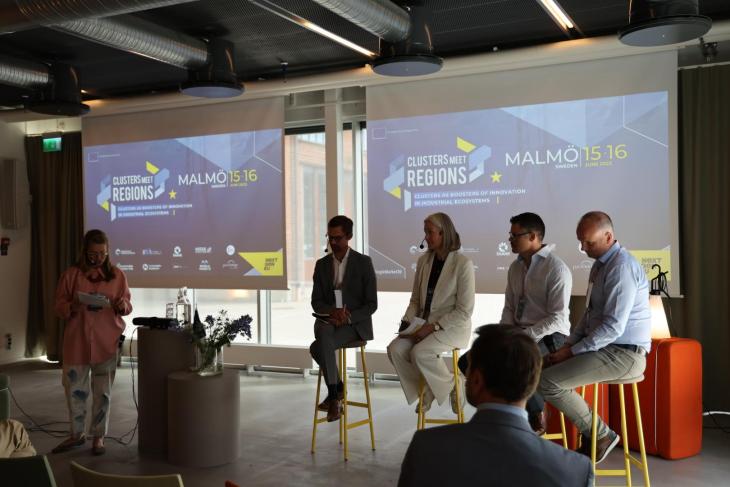Clusters meet Regions in Malmö, Skåne, Sweden
On 15 and 16 June 2023, the European Commission (DG GROW) and the European Cluster Collaboration Platform, in cooperation with Region Skåne, Media Evolution, Sustainable Business Hub, Livsmedels-Akademin, Syd Industriellt Utvecklings Centrum, Mobile Heights, Clusters of Sweden and Packbridge, organised a two-day workshop in Malmö, Sweden. The main event topic was “Clusters as Boosters of Innovation in industrial ecosystems.”
The event served to demonstrate the best examples in all of Skåne´s specialisation areas. It spotlighted how clusters act as drivers of regional competitiveness by identifying needs and opportunities, facilitating access to knowledge and through mobilising and facilitating cooperation among stakeholders. In addition to this, the capacity of clusters to promote interregional collaboration and strengthen EU value chains in different industrial ecosystems was also discussed. Alongside the one-and-a-half-day programme, participants were offered visits to companies specialising in tech, advanced materials & manufacturing, and life science & health.
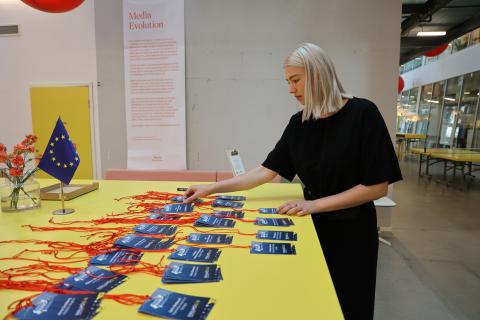 |
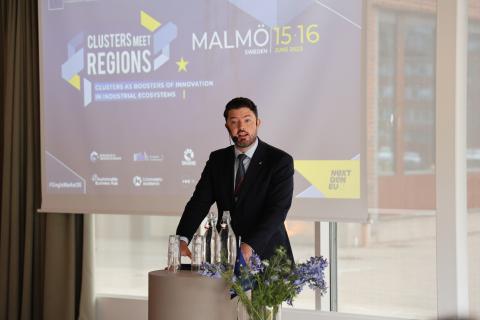 |
Summary Day 1
The opening session began with the introduction of the European Cluster Collaboration Platform by Teodora Jilkova, followed by representatives from the city of Malmö, Clusters of Sweden and the European Commission.
Roko Kursa, Deputy Chairman of Malmö explained the city’s creative and progressive character, focusing on development and innovation in several fields. The city has a long-established and respected start-up scene supported by a helpful entrepreneurial culture. Earlier this year, the Start-up District initiative was launched. The city aims to attract new people who want to contribute to development and innovation. He also emphasised on the good cross-border cooperation with Denmark through Greater Copenhagen, a Danish-Swedish political co-operation, while looking forward to cooperate more with Germany in the future.
Ola Svedin, CEO of Mobile Heights and Chairman of Clusters of Sweden, talked about Sweden’s excellent education system, nurturing a new generation of great minds. Sweden celebrates globally high living standards, excellent education and English skills that benefit collaboration on a global scale. The Swedish work-life balance also brings a high quality of life. Skåne is a region of creativity and innovation, a region that supports the innovation of start-ups and research and has a unique research department that fosters collaboration between many sectors.
Benoit Esmanne, a representative of DG GROW, reminded us that with the collaboration between regions comes great opportunities - and not only for clusters. Cluster meet Regions should allow collaboration between other regions and nations. It should also inspire local and international partners. Regarding the topic of the workshop, it is also timely to speak about innovation with several EU initiatives going on, such as the Partnerships for Regional Innovation in which Skåne is involved. The new EU Innovation Agenda released in 2022 also provides for opportunities to cooperate through European Innovation Ecosystems projects. Last but not least, Euroclusters are also an action that can support innovation among European clusters. The landscape to support innovation is wide, and clusters should play a role in bringing the right opportunities to their members to the SMEs whenever relevant.
Dr Jan-Philipp Kramer, Head of EU Services, Prognos, presented the recently published Input Papers on “Clusters as boosters of innovation in industrial ecosystems– the case of Skåne”, explaining the economic profile of the Skåne region, regional innovation level of the South Sweden region, regional competitiveness, and importance of clusters for regional economic development. Cross-border cooperation and the involvement of Skåne’s clusters in European networks and support initiatives were also presented.
During session 2, the audience was given the opportunity to learn about clusters and innovation ecosystems, addressing priorities and challenges in the digital and green transitions. A range of experts presented the strategies of their respective regions:
Daniel Kronmann (Region Skåne) – Productivity has been a primary goal of Region Skåne in the last few years. The areas that the region focuses on are Tech, Food, Life science and health, Smart sustainable cities, Advanced materials and manufacturing, Ess, Max IV and Science Villages. Advanced materials and manufacturing are the most significant areas of Malmö. Therefore, this area is prioritised.
Daniel Sköld (Region Blekinge) – In the region is low entrepreneurship; people prefer to be employed. Every year, the region loses young people, especially women, that move out of the region to study at non-tech universities. There is also a lack of funding for innovation ecosystems. We need to work toward funding opportunities, and we need to explore how to build critical mass.
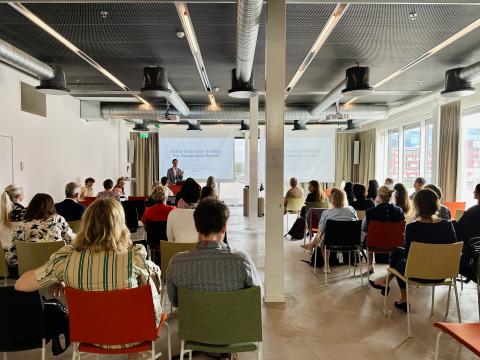 |
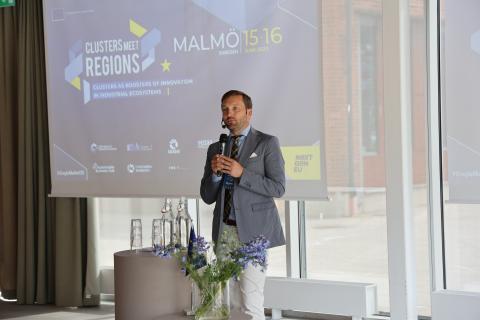 |
Presented regions and their strategies were followed by a panel discussion that focused on the Swedish collaboration model with innovation actors at regional, national and international levels:
Charlotte Ahlgren Moritz – We need to focus on humans, the same as on deep tech. The transformation of humans to reach specific goals is essential for further development, but to have civil society involved, we have to be aware that everyone should be part of the journey, or we will divide the world more.
Daniel Sköld - Clusters should be able to connect companies and public sectors with companies as they know their companies and their needs.
Here are a few of the other key comments from the discussion:
· It is essential that collaboration must start within the region before it expands abroad.
· Large companies work with universities and use university researchers. They are directly connected. We should talk more about SMEs. They have different needs. Clusters need to work with SMEs because they might not have the right resources.
· There is a lack of funding opportunities within individual regions. This should be improved.
· What should we do to get more funding and more international projects?
- Connect with the European network
- Expand the network
- Learn how to understand projects
Session 3 was dedicated to the role of enablers in the digital and green transitions. As previously mentioned by Daniel Kronmann, the region focuses on six areas: Tech; Food Innovation; Advanced Materials and Manufacturing; Smart Sustainable Cities; ESS, Max IV & the Science Village Innovation System and Life Science & Health. These areas were introduced to the audience.
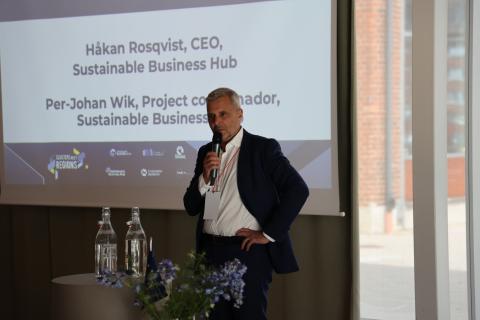 |
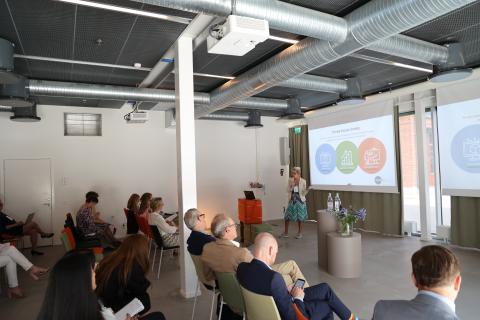 |
This highly informative session was followed by a session on Interregional collaboration, moderated by Benoit Esmanne, DG GROW, European Commission representative. The Policy Area Innovation of the EU Strategy for the Baltic Sea Region was introduced to the audience by Esa Kokkonen. Lars Persson Skandevall concluded the session by giving some feedback on how Nordic clusters are cooperating in practice, namely through matchmaking events.
After a long day of learning and discussions, attendees were then invited to enjoy bubbles and networking.
Summary Day 2
During the first session of Day 2, the focus was on the future of the cluster landscape. James Wilson took the participants through cluster history, policy, initiatives and challenges, while Pauline Capus introduced the CAFEIN project.
James Wilson – The cluster concept has economic and social roots. Cluster policies build on both but have been oriented to economic goals….Cluster initiatives provide solid foundations for supporting transformative policy initiatives.
Pauline Capus – CAFEIN´s objective is to prepare a joint long-term action plan to address SMEs and clusters' green and associated industrial transition challenges. The heart of the project lies in an inclusive and collaborative approach ensured by the involvement of national clusters´ associations and national innovation funding agencies. Several challenges include simplification, lack of skills and talents, funding opportunities and coordination.
After a coffee break full of conversations, guests rejoined session 2, where Futures for regional development and clusters were discussed.
Ewa Andersson spoke about clusters and intelligent specialisation strategies and the importance of supporting innovation and companies in prioritised areas of smart specialisation through regional cluster strategies/programmes and the connection of strengths areas: “It is essential for clusters and cluster managers to work closely within their region”. Central national policies were also discussed.
Ulrika Sjölund then introduced the New European Bauhaus and its definition, the University of Boras, and the NEB Compass project.
The Clusters meet Regions finished with a panel discussion on the future of the cluster ecosystem in Sweden and clusters-to-cluster collaboration in Europe. Last but not least, guests then had the opportunity to visit three companies working in the areas of tech, advanced materials and manufacturing, and food.
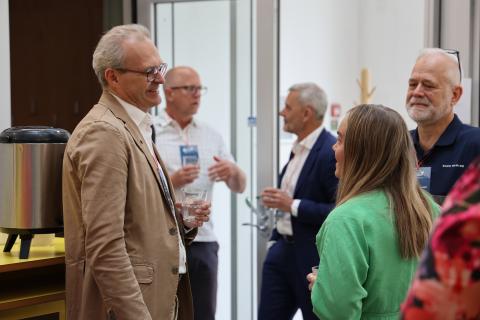 |
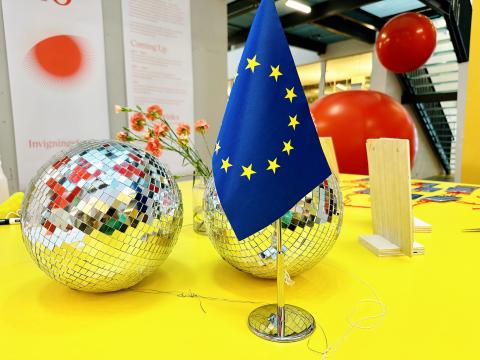 |
Some of the main key takeaways:
- Covid is often said to be the first time we had a concrete (and urgent) problem on the table within the EU that didn’t stop at borders. Through intense research, we came together to overcome these challenges. But, today, when talking about the green and digital transitions - the clock is ticking. We have more common problems than ever. We need to act fast and act together.
- One key to having an excellent innovation ecosystem is being successful in blending researchers and entrepreneurs/industry to an extended level. We need to experiment more with methods and dialogues between these stakeholders.
- Learning and sharing our experience in a mission-oriented way (including the civil society) of working on a daily basis will be a huge part of cluster organisations working life onwards.
- It will be key for cluster organisations to understand the spiderweb of funding opportunities in the EU to a deeper level. In part, for the cluster organisation itself, but also to understand how they can build real offers directly to members based on their needs through their respective EU projects.
Clusters meet Regions in Malmö provided an insightful look into the local industrial and innovation ecosystems, to Sweden’s culture of working practices and to local and regional cluster policy. It was a fantastic chance to make new connections, engage in discussions and a brilliant opportunity for learning.
For more Clusters meet Regions events, visit the ECCP.
Check out the Clusters meet Regions Sweden Flickr Album for all event photos.
Read the input paper for an in depth look at Clusters as boosters of innovation in industrial ecosystems– the case of Skåne
